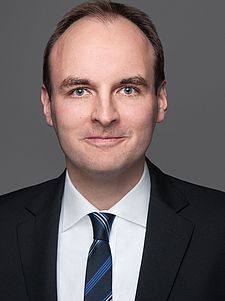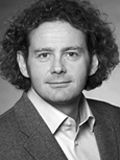Expired endowed professorships
You want to support a self chosen field of science? You want to give this science extra ressources and help to better the qualification for the students?
Exploit new fields of research in cooperation with the University of Bremen and help to establish new endowed chais.
The Chair can be named after you, if you want to.

Contact
Dr. Christina Jung
0421 218-60336
SFG 3150
christina.jungprotect me ?!vw.uni-bremenprotect me ?!.de
Prof. Dr. Johannes Schöning, Human-technology interaction
Lichtenberg Professorship of the Volkswagen Foundation
Department 03 / Computer Science
Period: 06/2016 - 06/2021to the complete article
Prof Dr Schöning's working group is concerned with the interaction between humans and technology - so-called human-computer interaction - in the Department of Mathematics/Computer Science. The new Lichtenberg professor's research project is entitled "Improving Spatial Interactions with Novel Ubiquitous Interfaces". In addition to the interfaces between machines and humans, the research will also focus on geoinformatics and ubiquitous computing, also known as the ubiquity of computers. Specifically, the research project is concerned with the design, quality testing and use of new navigation technologies - for smartwatches, for example.
"The technology we are building should enhance and improve human capabilities, but not replace them," says Schöning, explaining his idea. His research group is also analysing the properties of spatial data collected by laypeople and investigating which algorithms can be found for this. This includes maps that volunteers have designed themselves using GPS.
Prof. Dr. Claus Braxmeier, Aerospace technology
Christa and Manfred Fuchs Endowed Professorship
Faculty 04 / Production Engineering
Period: 07/2012 - 07/2022Claus Braxmaier is Professor at the Faculty of Production Engineering at the University of Bremen, Director of Space Technology at the Centre of Applied Space Technology and Microgravity ZARM at the University of Bremen and Head of the "System Enabling Technologies" department at the DLR Institute of Space Systems. His research focuses on the development of space-qualified technologies for the realisation of current and future space missions in earth observation, science and navigation.
Prof. Dr. Moritz Renner, Transnational business law
Lichtenberg Professorship of the Volkswagen Foundation
Period: August 2012 to July 2017As part of his Lichtenberg Professorship "Transnational Business Law between Contract and Enterprise" at the University of Bremen, Dr. Moritz Renner will investigate the question of what changes the law is undergoing as a result of the globalisation of the economy. This will be analysed using the example of transnational company law and the law of cross-border credit agreements.
Prof. Dr. Vasily Ploshikhin, Multiscale simulation and modelling of materials
Airbus endowed professorship
Period: December 2009 to November 2014The focus of the new Airbus Endowed Professorship for Integrative Simulation and Engineering of Materials and Processes (ISEMP) is the development and application of new methods for material and process simulation as well as the use of numerical simulation for the experimental development and optimisation of innovative manufacturing processes, particularly for the aviation industry. The new professorship will act as a scientific bridge between the Bremen Centre for Computational Materials Science and other industry-oriented research institutions at the University of Bremen. Close cooperation is planned with materials scientists at the university and affiliated institutes, as well as with the Centre for Engineering Mathematics. In terms of teaching, the Airbus endowed professorship will be heavily involved in the newly established interdisciplinary Master's programme in Computational Materials Science as well as in interdisciplinary graduate training.
The holder of the new Airbus endowed professorship, Prof. Dr Vasily Ploshikhin, has extensive experience in working with well-known industrial companies, particularly in the aviation industry such as Airbus, Premium Airotec, EADS, Rolls-Royce and MTU Aero Engines. Since 2001, he has built up and successfully managed the department for computer-aided process development at a research company Neue Materialien Bayreuth GmbH. Several manufacturing processes developed and optimised with the help of his scientific methods have already been implemented in series production at well-known companies in the aviation and automotive industries.
series production. These focal points will be further expanded in Bremen, particularly in the direction of industrialising innovative software solutions.
Prof. Dr. Udo Frese, Echtzeitbildverarbeitung
- Stiftungsprofessur der DFKI
- Zeitraum: Juni 2008 - Mai 2014
Real-Time Vision Working Group
Prof. Dr. Udo Frese arbeitet seit Juni 2008 als Juniorprofessor für Echtzeitbildverarbeitung im Fachbereich Mathematik / Informatik. Er ist Projektleiter im Sonderforschungsbereich SFB/TR 8 Raumkognition und assoziiert mit dem Deutschen Forschungszentrum für Künstliche Intelligenz (DFKI).
Udo Frese hat in Paderborn Informatik studiert und danach im Institut für Robotik und Mechatronik des Deutschen Zentrums für Luft- und Raumfahrt (DLR) gearbeitet. Er hat 2004 an der Friedrich-Alexander-Universität Erlangen-Nürnberg promoviert über einen hocheffizienten Algorithmus zur Berechnung globaler Karten aus lokalen Beobachtungen. Danach war er als Senior Researcher an der Universität Bremen und dem DFKI tätig.
Er beschäftigt sich mit Bildverarbeitung, also wie ein Computer auf Bildern automatisch etwas erkennen kann. Der Schwerpunkt liegt dabei auf Echtzeit, also wenn das Erkennen so schnell erfolgen muss. Anwendungen dafür sind industrielle Qualitätskontrolle, die Unterstützung des Operators eines ferngesteuerten Roboters durch ein automatisch generiertes 3D Modell der Umgebung oder, etwas spielerischer, die Wahrnehmung einer Spielszene durch einen Fussball spielenden Roboter.
Ein Spezialgebiet von Udo Frese sind Algorithmen für sicherheitsgerichtete Auswertung von Sensordaten, wie sie z.B. zur Absicherung von fahrerlosen Transportsystemen in der Industrie verwendet werden.
-> Homepage
Prof. Dr. Lucio Ciacchi, Grenzflächenforschung: Bio-Nano-Werkstofftechnik
- Conrad-Naber-Stiftungsprofessur
- Zeitraum: 2 Jahre ab 2007
Forschungsschwerpunkt:
Atomistische Untersuchungen an heterogenen Materialgrenzflächen und Oberflächen
Das Hauptthema der Forschung in der Conrad-Naber-Stiftungsprofessur "Grenzflächen in der Bio-Nano-Werkstofftechnik" ist die Untersuchung auf atomarer Skala von Grenzflächen zwischen unterschiedlichen Materialien und zwischen technischen Werkstoffen und biologische Makromolekülen. Wir verwenden verschiedene computergestützte Modellierungsmethoden, sowie experimentelle Techniken der Oberflächenanalytik wie z.B. Kraftspektroskopie und Elektrochemie. Unsere Forschungsthemen sind von aktueller Relevanz für die Entwicklung von medizinischen Implantaten, Biosensoren, bioverträglichen Klebstoffen, antifouling-Oberflächen, um einige wichtige Beispiele zu nennen.
Wichtigstes Projekt:
Koordination des EU-Projektes "Adhesion and Cohesion at Interfaces in High Performance Glassy Systems" im 7. Rahmenprogramm (Small and medium scale focused research project), mit sieben Partnerinstitutionen von fünf Eu-Ländern.
-> Homepage


